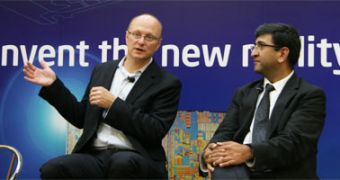Intel has rectified statements coming from one of its executives attending a Developer Forum in Taipei earlier this week, regarding the iPhone as a device incapable of handling the Internet properly. Intel's exec had touted the company's next-gen Moorestown platform as the logical replacement of the ARM processor currently found in Apple's iPhone.
The news follows a posting on Intel's Chip Shots blog Thursday afternoon, where Anand Chandrasekher, the head of Intel's low-power efforts, is cited as denying his fellow exec’s allegations. Chandrasekher “betrayed” his colleagues by admitting that Intel's current low-power x86 processors don't even come close to the consumption numbers previously stated.
At Thursday's event, both Intel Vice President of Mobility Shane Wall and colleague Pankaj Kedia officially expressed their worries about the iPhone relying on ARM-based solutions, should Apple want to achieve "fast, full Internet" any time soon. "Even if they do have full capability, the performance will be so poor," Wall said. Kedia added fuel to the fire stating "I know what their roadmap is, I know where they're going and I'm not worried".
Now, the Chip Shots blog reads...
Anand Chandrasekher issued a correction on comments made by members of his team yesterday at Intel's Developer Forum in Taiwan. As general manager of the Group responsible for Intel's ultra-mobility products, he acknowledged that Intel's low-power Atom processor does not yet match the battery life characteristics of the ARM processor in a phone form factor; and, that while Intel does have plans on the books to get us to be competitive in the ultra low power domain - we are not there as yet. Secondly, Apple's iPhone offering is an extremely innovative product that enables new and exciting market opportunities. The statements made in Taiwan were inappropriate, and Intel representatives should not have been commenting on specific customer designs.
A CNet piece goes to mention that an apology like this coming from Intel raises some serious doubts about the once-good relationship between Apple and the famous chip maker. It is also worth noting that Intel and the Mac maker have been partners for over three years, while Apple's recent acquisition of low-power chip designer PA Semi is beginning to sound more like the end of this partnership (at least, as far as portables are concerned).

 14 DAY TRIAL //
14 DAY TRIAL //